
The Antarctic Treaty and related agreements, collectively known as the Antarctic Treaty System (ATS), regulate international relations with respect to Antarctica, Earth's only continent without a native human population. It was the first arms control agreement established during the Cold War, designating the continent as a scientific preserve, establishing freedom of scientific investigation, and banning military activity; for the purposes of the treaty system, Antarctica is defined as all the land and ice shelves south of 60°S latitude. Since September 2004, the Antarctic Treaty Secretariat, which implements the treaty system, is headquartered in Buenos Aires, Argentina.
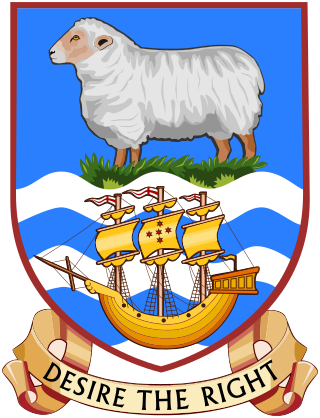
The politics of the Falkland Islands takes place in a framework of a constitutional monarchy and parliamentary representative democratic dependency as set out by the constitution, whereby the Governor exercises the duties of head of state in the absence of the monarch, and the Chief Executive is the head of the Civil Service, with an elected Legislative Assembly to propose new laws, national policy, approve finance and hold the executive to account.
Life imprisonment is any sentence of imprisonment under which the convicted individual is to remain incarcerated for the rest of their natural life. Crimes that result in life imprisonment are considered extremely serious and usually violent. Examples of these crimes are murder, torture, terrorism, child abuse resulting in death, rape, espionage, treason, illegal drug trade, human trafficking, severe fraud and financial crimes, aggravated property damage, arson, hate crime, kidnapping, burglary, robbery, theft, piracy, aircraft hijacking, and genocide.
In music, an intermezzo, in the most general sense, is a composition which fits between other musical or dramatic entities, such as acts of a play or movements of a larger musical work. In music history, the term has had several different usages, which fit into two general categories: the opera intermezzo and the instrumental intermezzo.

The ratlines were systems of escape routes for German Nazis and other fascists fleeing Europe from 1945 onwards in the aftermath of World War II. These escape routes mainly led toward havens in the Americas, particularly in Argentina, though also in Paraguay, Colombia, Brazil, Uruguay, Mexico, Peru, Guatemala, Ecuador, and Bolivia, as well as the United States, Canada, Australia, Spain, and Switzerland.

Luis Enríquez Bacalov was an Argentine film composer and musical director. He learned music from Enrique Barenboim, father of Daniel Barenboim - conductor of the Berlin and Chicago orchestras, and from Berta Sujovolsky. He ventured into music for the cinema, and composed now-classic scores for many Spaghetti Western films. In the early 1970s he also collaborated with Italian progressive rock bands. Bacalov was nominated twice for the Academy Award for Best Original Score, winning it in 1996 for Il Postino.
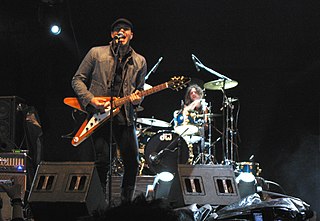
Catupecu Machu is an Argentine rock band, usually classified as within Rock en Español. Its current band members are Fernando Ruiz Díaz on vocals and guitar; Charlie Noguera on bass guitar; Agustín Rocino and Julian Gondell on drums; and Macabre González on keyboards and samplers.
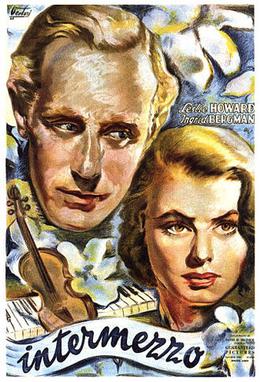
Intermezzo is a 1939 American romantic film remake of the 1936 Swedish film of the same title. It stars Leslie Howard as a married virtuoso violinist who falls in love with his accompanist, played by Ingrid Bergman in her Hollywood debut. Bergman had played the same role in the Swedish original against Gösta Ekman. The film was directed by Gregory Ratoff and produced by David O. Selznick. It features multiple orchestrations of Heinz Provost's title piece, which won a contest associated with the original film's production. The screenplay by George O'Neil was based on that of the original film by Gösta Stevens and Gustaf Molander. It was produced by Selznick International Pictures.

Luis Moglia Barth was an Argentine film director and screenwriter, and one of the influential directors in the Golden Age of Argentine cinema. He directed some 30 films between 1927 and 1959, often screenwriting for his pictures. He died in Buenos Aires, aged 81.

Current and historical relations between the Argentine Republic and the Russian Federation have existed for decades. Both nations are members of the G20 and the United Nations.

Argentina, officially the Argentine Republic, is a country in the southern half of South America. Argentina covers an area of 2,780,400 km2 (1,073,500 sq mi), making it the second-largest country in South America after Brazil, the fourth-largest country in the Americas, and the eighth-largest country in the world. It shares the bulk of the Southern Cone with Chile to the west, and is also bordered by Bolivia and Paraguay to the north, Brazil to the northeast, Uruguay and the South Atlantic Ocean to the east, and the Drake Passage to the south. Argentina is a federal state subdivided into twenty-three provinces, and one autonomous city, which is the federal capital and largest city of the nation, Buenos Aires. The provinces and the capital have their own constitutions, but exist under a federal system. Argentina claims sovereignty over the Falkland Islands, South Georgia and the South Sandwich Islands, the Southern Patagonian Ice Field, and a part of Antarctica.
Carlos Castro may refer to:
Carlo Franchi was an Italian opera composer known for his opere buffe. He belonged to the Neapolitan school of composers and it is likely that he was born in or near Naples, where his first opera La vedova capricciosa had its premiere in 1765. Subsequent works were performed in Rome, Venice, Mantua, Turin, Florence, and outside Italy in places such as Dresden and Lisbon.
The Enchanted is a 1950 English adaptation by Maurice Valency of the play Intermezzo written in 1933 by French dramatist Jean Giraudoux.
Intermezzo, was a British Thoroughbred racehorse and sire. He won two of his three races as a two-year-old in 1968 and went on to record his most important win in the Classic St. Leger Stakes at Doncaster in September 1969. He raced without winning in 1970 and was exported to stand as stallion in Japan, where he had some success as a sire of winners.
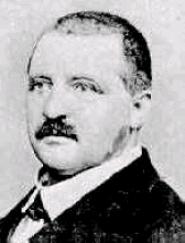
The Intermezzo in D minor is an 1879 composition by the Austrian composer Anton Bruckner. Although it was intended to replace the scherzo of the String Quintet, that piece was instead performed in its original form; the Intermezzo was not publicly premiered until after the composer's death.

"Key West Intermezzo (I Saw You First)" is a song by American rock musician John Mellencamp. It was released as the first single from his 14th studio album, Mr. Happy Go Lucky (1996), and peaked at number 14 on the US Billboard Hot 100, making it his final top-40 hit in the US. In Canada, it gave Mellencamp his fourth number-one single on the RPM 100 Hit Tracks chart, staying at number one for five weeks. It additionally reached the top 40 in Australia and New Zealand. The song's music video features American actor Matthew McConaughey.

Ophélie Bau is a French actress best known for her roles in Mektoub, My Love: Canto Uno and its sequel Mektoub, My Love: Intermezzo.

Vanesa Raquel Siley is an Argentine lawyer, trade unionist and politician, currently serving as National Deputy representing Buenos Aires Province. A member of the Justicialist Party, Siley was elected in 2017 for the Unidad Ciudadana coalition, and currently sits in the Frente de Todos bloc.
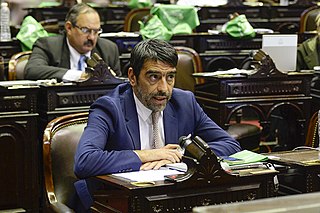
Luis Rodolfo Tailhade is an Argentine lawyer specialized in criminal law and politician, currently serving as National Deputy representing Buenos Aires Province. A member of the Justicialist Party and La Cámpora, Tailhade was first elected in 2015 and was re-elected in 2019. He previously served as General Inspector of Justice from 2013 to 2014, during the presidency of Cristina Fernández de Kirchner, and as the Chamber of Deputies' representative in the Council of Magistracy from 2016 to 2018.














